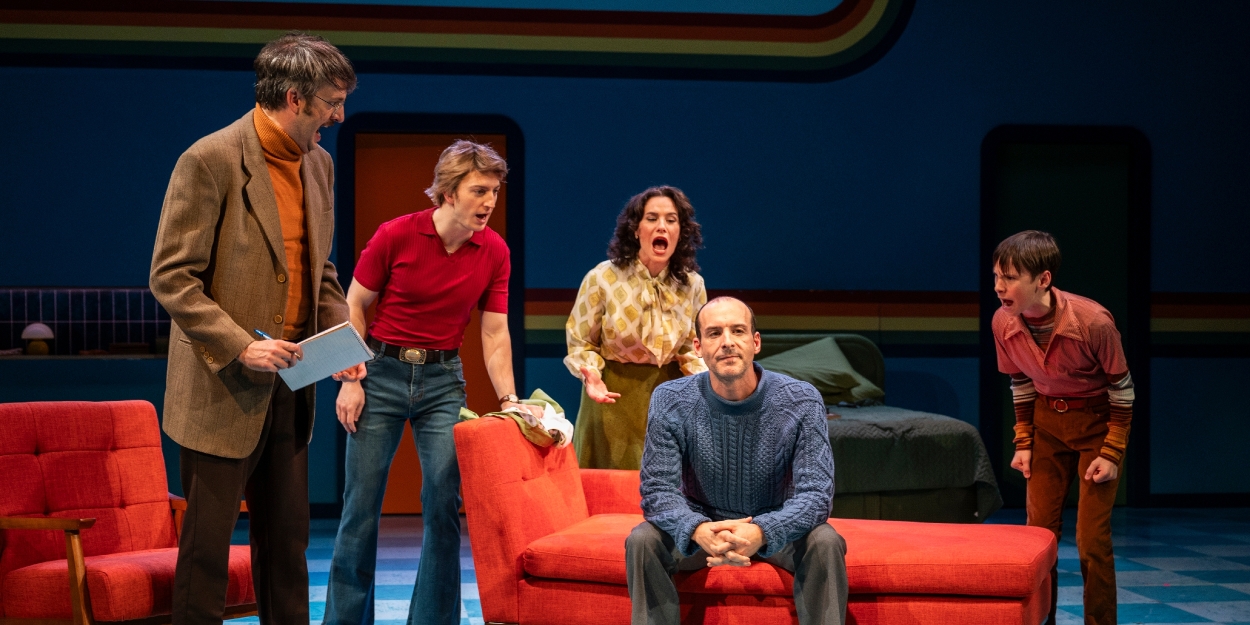Review: FALSETTOS presented by Court Theatre and TimeLine Theatre Company
Director Nick Bowling’s superbly sung revival of William Finn and James Lapine’s musical runs through December 15, 2024

FALSETTOS, originally written as two-one act musicals set in 1979 and 1981, respectively, feels simultaneously dated and prescient. In this co-production from Court Theatre and TimeLine Theatre Company, director Nick Bowling leads a first-rate ensemble that preserves the musical as a period piece but also makes it feel utterly alive. Lauren Nichols’s set design evokes a 1970s retro roller rink and Theresa Ham’s costume designs also use extremely ‘70s colors (and each character wears a signature color). But many of the show’s central themes hit now as ahead of their time and eerily relevant. In particular, the musical’s reverence for Jewish culture and tradition and its unabashed embrace of queer love are especially moving at a time when anti-Semitism and homophobia seem tragically on the rise in America.
I admire FALSETTOS’ deep sense of sophistication and cleverness. Finn’s score has a specific aesthetic and bounces gracefully between uptempo and downtempo, and his lyric density is a feat — though the lyrics are fortunately never muddled in this production. While FALSETTOS is entirely sung-through, Lapine helped shape the narrative: Marvin (Stephen Schellhardt) leaves his wife Trina (Sarah Bockel) for his male friend Whizzer (Jack Ball). Marvin and Trina’s pre-teen son Jason (Charlie Long, who alternates with Eli Vander Griend), soon to reach Bar Mitzvah age, struggles with his parents’ divorce and his resentment towards his father. To cope with her divorce, Trina decides to pay a visit to Marvin’s psychiatrist, Mendel (Jackson Evans). Mendel falls in love with Trina and they marry. Following so far? While the first act — MARCH OF THE FALSETTOS — follows this core group of five, the second act — FALSETTOLAND — introduces Marvin’s lesbian friends Dr. Charlotte (Sharriese Hamilton) and Cordelia (Elizabeth Stenholt) into the mix as the then-unidentified AIDS epidemic takes hold in NYC.
Many of FALSETTOS’ observations about love, family, and toxic masculinity are razor sharp. Finn’s lyrics are exceedingly clever. Even though the characters sometimes feel like archetypes, Finn’s music and lyrics precisely capture their emotional states. While Marvin is meant to be the central thread of this rapidly unraveling “Tight-Knit Family,” Schellhardt is subtle and soft-spoken. Schellhardt conveys Marvin’s immense selfishness and delusion that his ex-wife, lover, and son will be fast friends in the wake of his actions, but his performance isn’t flashy. In some ways, Schellhardt’s delicate take on Marvin makes the character all the more infuriating — he’s not such a remarkable man to cause all this family turmoil. Similarly, Ball has a laidback take on Whizzer, who’s meant to be irresistible. While that energy matches Schellhardt’s understated Marvin, Ball’s performance resonates more in somber moments than the upbeat ones meant to demonstrate Whizzer’s magnetism. It’s the sadder moments when Ball’s Whizzer shines; his performance of the devastating 11 o’clock number “You Gotta Die Sometime” is remarkably moving.
Likewise, Schellhardt’s understated take allows some of his fellow players to truly shine. While the cast is wonderful across the board, Bockel is perhaps the most winsome of all. She conveys Trina’s anger and anxiety with wit and humor. Her take on Trina’s meltdown number “I’m Breaking Down” is an absolute showstopper in the first act as she increasingly gives into her emotions about her divorce. She’s brilliant. Evans has a winningly daffy take on Mendel; he’s immensely funny but he also nicely essays the character’s soft center and warm heartedness. Long is commanding and charming as Jason. His finely honed performance underscores Jason’s precociousness and keen observational skills even as his parents bicker like teenagers. In fact, Schellhardt and Long together nicely demonstrate the dual adolescent experiences of their characters. While Marvin seems to revert to petty teenage behavior until the tragic events of the second act force him to grow up, Jason likewise prepares to enter his teenage years and to assume the role of an adult in the Jewish faith. Long nails Jason’s simultaneous interiority and external exasperation, while Schellhardt’s softness as Marvin seems to contrast with his initial blindness to the hurt he caused his loved ones.
This ensemble smartly threads the needle between moments of anxiety, bickering, and sadness with moments of joyful connection and humor. All of it is present in FALSETTOS, and it’s special to see these actors handle the widely varying emotional beats so well. While Dr. Charlotte and Cordelia mostly offer comic relief, it’s Dr. Charlotte’s foretelling that “Something Bad Is Happening” shifts the second act from familial chaos to more somber in the wake of AIDS (although admittedly that’s perhaps the least effective song— it’s too on the nose and lacks lyrical specificity). Still, Hamilton and Stenholt have a fun rapport that mostly infuses some levity and adds new energy to the dynamics from the first act.
FALSETTOS is a sophisticated, ambitious, and cerebral musical, and I think it’s truly unique. While it’s a serious show, Bowling’s production really brings out the heart in it. This production and ensemble honor FALSETTOS as a product of its time, but the emotions feel immediate and the show’s embrace of self-acceptance and the questioning of traditional gender roles feel fresh. Plus, it’s simply a treat to hear Finn’s score sung so gorgeously and with such great commitment and depth of feeling.
Court Theatre and TimeLine Theatre Company’s co-production of FALSETTOS runs through December 15, 2024 at Court Theatre, 5335 North Ellis Avenue. Tickets are $58 - $90.
Visit courttheatre.org for tickets
Photo Credit: Michael Brosilow
Reader Reviews
Videos

